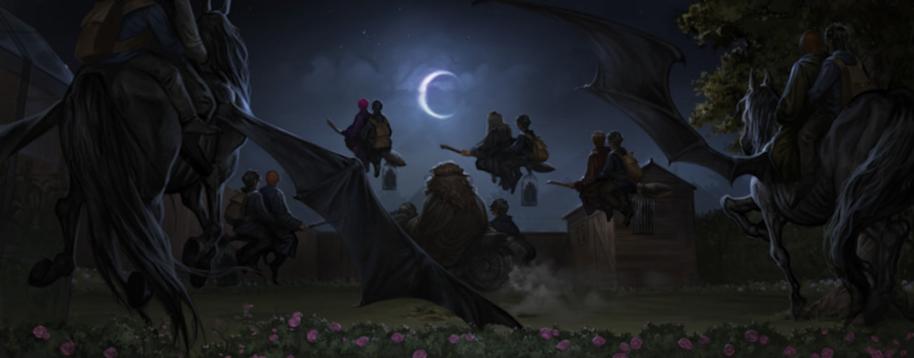
Despite his ‘status’ and, as it turned out, the fact he turned out to be a rather powerful wizard, Harry still made mistakes. In fact some of them turned out to be deadly...
Sectumsempra
When Harry picked up the seemingly innocuous second-hand Potions book, we had no idea just how important it was going to be. Although the amendments scribbled in the margins initially annoyed him, Harry soon realised their worth. These handy shortcuts transformed Harry into a Potions pro, and he was soon perusing the book whenever he got a spare minute.
The Half-Blood Prince, who had written these notes, even helped to save Ron’s life when he drank poisoned mead, thanks to a hurried ‘Just shove a bezoar down their throats’ at the bottom of a page. It’s not hard to see why Harry had come to trust them – all of the additions appeared to offer helpful assistance and there hadn’t been a sniff of Dark magic, despite Hermione’s suspicions.
Harry probably thought the Sectumsempra spell, noted as ‘for enemies’, would fling the victim upside down or just send him to the floor, based on the results of previous enchantments. So when he used it on Malfoy during a confrontation, nobody was as shocked as Harry to see the ensuing bloodbath. Trying an untested spell from an unknown author wasn’t the best decision he ever made, but he definitely learned a lesson from it.

Not taking Occlumency seriously
Harry didn’t have a natural affinity for Snape’s specialist skill, and this caused even more tension between the two when it came to Snape having to teach Harry to ‘close his mind’. Harry couldn’t wholly be blamed though: after all, who would happily let someone they see as their enemy into their innermost thoughts? So instead of trying to shut out the glimpses into Voldemort’s mind, Harry obsessed about them. He was convinced that he could use this skill to help – in the same way that he knew Mr Weasley had been attacked by Nagini.
Despite knowing he shouldn’t be doing it and Hermione constantly warning him about it, he kept allowing Voldemort in. As a result, his mind was open to Voldemort’s trap when he showed him an image of Sirius being tortured. The heartbreaking twist that Harry’s mission to ‘save’ Sirius actually ended in his godfather’s death was something he never forgave himself for.

Borrowing the flying car
Technically, this ill-fated idea was the brainchild of one Ronald Weasley, but Harry didn’t exactly try to talk his best friend out of flying Arthur’s enchanted Ford Anglia to Hogwarts. Had Harry been thinking sensibly – or (more likely) if Hermione had been with them – he would have sent a message on to Hogwarts with Hedwig and awaited instructions on what to do. But instead they decided to make an entrance.
Of course, it wasn’t long before they were completely regretting that decision, and that was before they crashed into the Whomping Willow. Had they known that their adventure would result in them missing the Sorting, encountering a smug Snape, nearly getting expelled and leave Mr Weasley facing an enquiry at the Ministry of Magic, maybe they would've decided on alternative transport. Hindsight is a wonderful thing, and something that wizards are at the mercy of just as much as Muggles.

Accusing Malfoy of cursing Katie Bell
This is an interesting one, because Harry was correct – Draco Malfoy was behind the horrible incident, in a slapdash and panicked attempt to complete his mission for Voldemort. But it didn’t matter that Harry was right; what mattered was the way he decided to present his argument. It was a fury-filled spur-of-the-moment decision, and he blurted out the accusation without any evidence to back it up. Just saying he ‘knew’ was never going to cut the mustard with someone as no-nonsense as Professor McGonagall.
His tendency to be hot-headed and impulsive had caused problems for him before and this time it meant he wasn’t taken seriously. His rivalry with Malfoy was widely known around the school, and even Ron and Hermione – usually his staunchest of supporters – didn’t believe his theories. Like most of Harry’s bad decisions, it was born out of good intentions: he wanted to make sure the culprit was caught before anybody else got hurt.

Trusting Riddle’s diary
This error in judgement was early on in Harry’s magical journey, but considering he had witnessed some incredible things in the wizarding world already, it would have been wise to err on the side of caution. When Moaning Myrtle drew their attention to the shabby, soaking-wet book in her bathroom, Harry’s first instinct was to pick it up and study it, much to Ron’s dismay. Despite his warnings that it could be dangerous, and his many grim anecdotes involving cursed books, Harry wasn’t put off. Instead, wondering if it had anything to do with the mysterious Chamber of Secrets, he decided to pocket it. When he wrote on a page and the book ‘answered’ him, he jumped eagerly into the conversation, and even when the book allowed him to ‘step’ into a memory, he trusted it.
Just like Ginny before him, he was won over by the charming, perfectly behaved Tom Riddle with a lonely story not unlike his own. It’s another example of how Harry’s desire to do the right thing often sent him into danger – here, with the prospect of Hogwarts having to close and the attacks on students, he wanted to glean as much information as possible about the Chamber in order to help.

Disarming Stan Shunpike
The Order of the Phoenix had a brilliant strategy to outwit the Death Eaters when the time came to transport him from the Dursleys’: seven Harry Potters. How could they possibly guess which one would be the real Harry Potter?
Unfortunately, amid all the chaos, Harry himself gave the game away when he realised the Knight Bus conductor Stan Shunpike was fighting with Voldemort’s supporters. Having met Stan when he was on the run after blowing up Aunt Marge, Harry couldn’t bring himself to inflict real damage. His reasoning was sound – what if he was under the Imperius Curse and completely innocent of any wrongdoing? Unfortunately, the spell he hit Stan with – Expelliarmus – didn’t only disarm him, it also helped Voldemort identify him. As Lupin pointed out, it had become Harry’s signature move, and one that had actually saved his life when he was fighting the Dark Lord previously.
It was a bad decision on Harry’s part in terms of battle strategy because it focused all the attention on him and Hagrid, something the Order were very keen to avoid, and it put them in serious danger. But it was a good decision for Harry’s soul and sanity – Harry wasn’t a killer, he was a champion of the underdog and always trying to do the right thing. Knowingly injuring – or worse, killing – an innocent would have had a terrible effect on him and who knows, it could have sent him down a seriously dark path.




